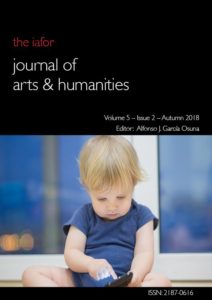IAFOR Journal of Arts & Humanities: Volume 5 – Issue 2
Editor: Dr Alfonso J. García Osuna, Hofstra University in New York, USA
Published: November 2, 2018
ISSN: 2187-0616
https://doi.org/10.22492/ijah.5.2
Editor’s Introduction
 In reviewing the articles included in this issue of the IAFOR Journal of Arts and Humanities, what comes to mind is that there is a growing preoccupation among scholars about the future of the word.
In reviewing the articles included in this issue of the IAFOR Journal of Arts and Humanities, what comes to mind is that there is a growing preoccupation among scholars about the future of the word.
In her article, Angeliki Monnier identifies the topical repertoires, the underlying schemas that structure the fake news debate, focussing attention on the mainstream French press; Er-Win Tan suggests that the advent of the Internet and the Information Age, has also brought a proliferation in the phenomenon known as fake news; Lily Halpert Zamir focuses her study on the works of three different groups of writers who dared to write in Auschwitz-Birkenau, where anyone caught with a piece of paper or a pencil stub was immediately sentenced to death; Isra Daraiseh and M. Keith Booker analyse Tayeb Salih’s Season of Migration to the North (1967), probably the most widely read Arabic novel in English; Isabel Pascua Febles aims to make a contribution to the ongoing project of establishing the normative foundations for a critical theory of ethical translation; Alyssa Acierno seeks to provide an archetypal instance of the problematic phenomenon of film remaking while analysing Fellini’s 8½ and Marshall’s remake of it, Nine; the Editor’s Essay emphasises the continuing decline of the word as it wages an unequal battle with today’s technology; and finally, Thomas G. Endress reminds us of the power of words when set to music. Exactly fifty years ago, 1968 – nestled between the Summer of Love (‘67) and Woodstock (‘69) – was known as the year of revolt.
The IAFOR Journal of Arts & Humanities publishes original articles on all aspects of the arts and humanities; that is to say, we are interested in works that study and document the varied ways in which people methodise and endeavour to decipher the human experience. In seeking to direct the journal’s critical perspectives toward innovative and pioneering terrain, we welcome articles that take a diagnostic approach to the assumptions that have long predisposed the study of literature, philosophy, art, history, religion, music and language.
We welcome submissions related to the arts and humanities from academics, practitioners and professionals from within the field.
Best regards,
Dr Alfonso J. García Osuna
Editor
IAFOR Journal of Arts & Humanities

